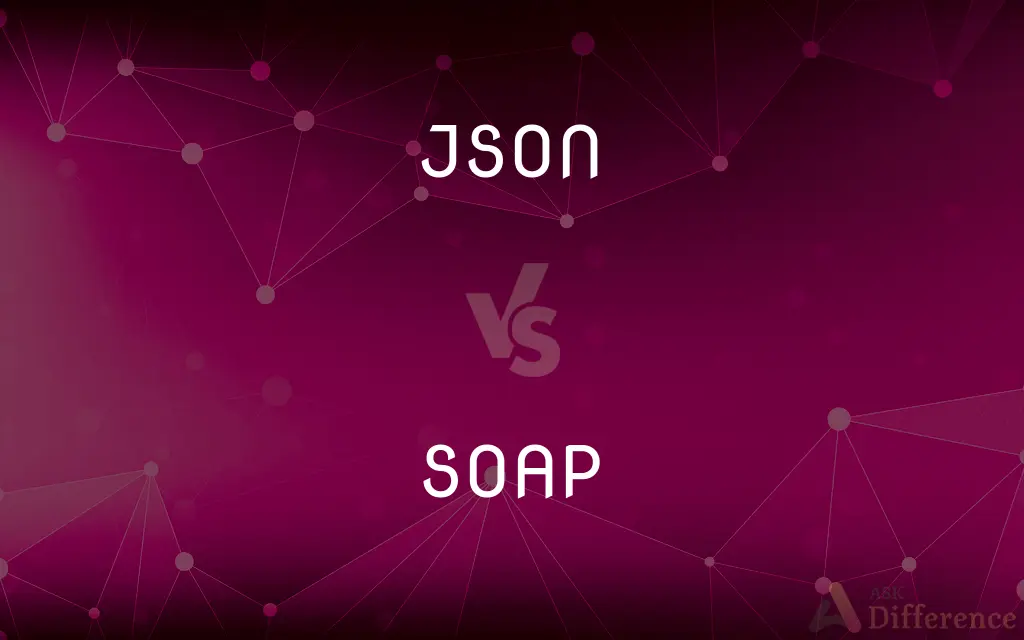JSON vs. SOAP — What's the Difference?
By Tayyaba Rehman — Published on January 7, 2024
JSON (JavaScript Object Notation) is a lightweight data-interchange format, easy to read and write for humans. SOAP (Simple Object Access Protocol) is a protocol for exchanging structured information in web services.

Difference Between JSON and SOAP
Table of Contents
ADVERTISEMENT
Key Differences
JSON (JavaScript Object Notation) is a text-based format used for data interchange. It's derived from JavaScript, but its usage is language-independent. JSON is known for its simplicity and ease of use, making it popular in modern web applications for sending and receiving data. On the other hand, SOAP (Simple Object Access Protocol) is a protocol used for exchanging structured information in the implementation of web services. It uses XML to encode its data and is designed to support complex interaction patterns.
In terms of structure, JSON uses a concise data format with a key-value pair structure, which makes it more readable and efficient in terms of data size. SOAP, in contrast, is an XML-based protocol that encapsulates its data in a more verbose structure. This verbosity often results in larger message sizes compared to JSON.
JSON is typically used in REST (Representational State Transfer) APIs, which are known for their scalability and performance. It's particularly suitable for mobile and web applications where bandwidth and performance are critical. SOAP, however, is often used in enterprise-level web services where higher security and transactional reliability are required. SOAP supports complex operations and offers built-in error handling through its protocol.
Security in JSON is generally handled at the transport level, such as using HTTPS. SOAP provides a higher level of built-in security features, such as WS-Security, supporting encryption and authentication at the SOAP message level, making it more suitable for confidential data transactions.
Finally, in terms of interoperability, SOAP has an advantage due to its use of XML, which is a widely accepted standard in enterprise systems. JSON, while being highly popular in modern web applications, may require additional considerations for integration with legacy systems.
ADVERTISEMENT
Comparison Chart
Format
Lightweight, text-based, key-value pairs.
XML-based, more verbose.
Usage
Common in REST APIs, web, and mobile applications.
Used in complex enterprise web services.
Size
Smaller data size, efficient.
Larger message size due to verbosity.
Security
Transport-level security (like HTTPS).
Built-in security features (WS-Security).
Interoperability
High with modern web technologies, less with legacy systems.
High with enterprise systems due to XML standard.
Compare with Definitions
JSON
JSON uses a human-readable text format.
The configuration settings were stored as a JSON file.
SOAP
Supports built-in error handling and security features.
The SOAP message included WS-Security headers for encryption.
JSON
It's commonly used in web applications.
AJAX requests on the website used JSON for data exchange.
SOAP
Suitable for complex, secure web services.
The medical records system implemented a SOAP-based service for data exchange.
JSON
Ideal for applications requiring efficient data transmission.
The IoT device sent sensor data in a compact JSON format.
SOAP
Widely used in enterprise-level applications.
The banking system used SOAP for secure transaction processing.
JSON
JSON is a lightweight data interchange format.
The mobile app received user data in JSON format.
SOAP
SOAP is a protocol for exchanging structured information.
The web service communicated with clients using SOAP messages.
JSON
JSON structures data in key-value pairs.
The API response was parsed from a JSON object.
SOAP
SOAP messages are encoded in XML.
The client sent a SOAP request in XML format to the server.
Common Curiosities
What is JSON primarily used for?
JSON is used for data interchange in web and mobile applications.
Can SOAP be used with REST APIs?
While possible, SOAP is traditionally used with more complex web service protocols.
What are the main features of SOAP?
SOAP is known for its structured messaging, security, and error handling in web services.
Is JSON limited to JavaScript-based applications?
No, JSON is language-independent and used across various programming environments.
Which is better for mobile app development, JSON or SOAP?
JSON is generally preferred for mobile apps due to its efficiency and lighter weight.
What makes JSON popular in modern web development?
Its readability, simplicity, and efficiency in data interchange.
Is JSON more lightweight than SOAP?
Yes, JSON is more lightweight due to its simple, text-based format.
How does SOAP handle security?
SOAP supports advanced security features like WS-Security for encryption and authentication.
Can JSON be used for enterprise applications?
Yes, though integration with legacy systems might require additional considerations.
Is SOAP still widely used?
Yes, particularly in enterprise and complex web service applications.
What are the advantages of SOAP in web services?
SOAP offers robust security, standardized protocol, and reliable error handling.
Are JSON and SOAP interchangeable?
Not typically, as they serve different purposes and are used in different contexts.
Does SOAP support complex operations better than JSON?
Yes, due to its protocol design and features like WS-Security.
How do JSON and SOAP handle data formatting?
JSON uses key-value pairs, while SOAP uses a structured XML format.
What type of applications is JSON best suited for?
JSON is ideal for web and mobile applications where quick and efficient data exchange is needed.
Share Your Discovery

Previous Comparison
Bid Price vs. Offer Price
Next Comparison
Trade-Off vs. Opportunity CostAuthor Spotlight
Written by
Tayyaba RehmanTayyaba Rehman is a distinguished writer, currently serving as a primary contributor to askdifference.com. As a researcher in semantics and etymology, Tayyaba's passion for the complexity of languages and their distinctions has found a perfect home on the platform. Tayyaba delves into the intricacies of language, distinguishing between commonly confused words and phrases, thereby providing clarity for readers worldwide.
















































